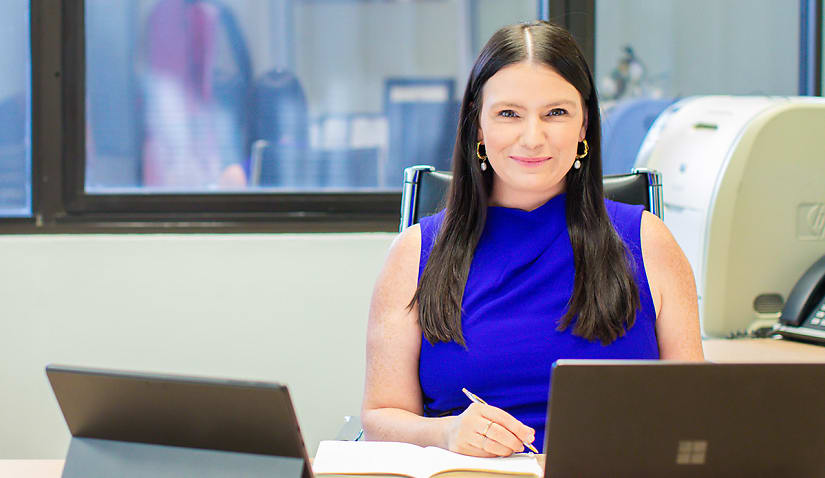According to one young lawyer who launched her own practice 12 months ago, starting a new firm is like learning how to fly a plane before it hits the ground. Here, she shares her top tips for those wanting to run their own legal practice one day.

In a recent episode of The Boutique Lawyer Show, M de Mestre Lawyers founder Mary-Ann de Mestre reflected on what the past 12 months since the inception of her firm have been like, whether she has been able to hold true to her founding mission, demystifying what the first year is like, the non-negotiable things that new firm owners must know, and how overwhelming it can be to start one’s own practice.
“Imagine jumping from a plane as it’s falling apart around you. You’ve been handed an instruction book, and you are required to reassemble that aircraft as it’s falling through the sky.”
“That’s something that I have remembered as I’ve progressed, so it’s what I say to most people when they’re determined to set up their own firm: if I can fly the plane and throw the handbook out, you can do it, too,” she said.
De Mestre further detailed some of the essential questions that one must ask of one’s self to get started, in addition to doing their practice management course.
“How much money do I actually need to start up? Will I make a profit in the first year? What expenses do I need to project? How will I know when to employ staff? And for me, I had that added element of being a woman and having children. So, asking those questions of my female peers, can you have it all? How do you manage the workload when you’ve got kids at home? And how can you ensure that you still have a successful marriage if you have a partner at home?” she said,
Answering these questions and then reflecting on the next steps can be overwhelming, de Mestre mused.
“I really relied on my peers and colleagues to support me, being comfortable enough to ask for help and ask for work and ask people what worked for them and what didn’t. That’s why I wanted to come on [this podcast episode], so that people felt they could take that away and know that it’s fine to ask others, because most people in that position have been in your position before and are more than happy to help,” she said.
Late last year, de Mestre appeared on The Protégé Podcast, in which she discussed her experience of being both a firm owner and academic, as well as the importance of technology and outsourcing for those running their own practices.
Her strengths, she noted, are being an academic and a lawyer first.
“The idea of being a business owner, an influencer, [and] a marketer were not my strengths or anything that I had ever considered would be an important element of the whole of the business. I’m an expert in what I do. I need to reach out to others [who] are experts in marketing, accounting, and business management,” de Mestre said.
“I leaned on people that I knew had been successful in those areas, and I went to them and said, ‘Look, how could I make this area work for my business?’ So, it really required personal upskilling, and it has been a very quick learning curve, which I’m happy about.”
When asked about challenges, de Mestre said that “underestimating how quickly things would accelerate and [how] word of mouth is everything”.
“So, we were lucky enough to really achieve our goals, all the goals that we had set very early on. It got to a stage which was quite overwhelming, where I was trying to put on all the different hats of not only as a lawyer, and then as a mum and a wife, but also as a business owner dealing with the marketing,” she said
“So, for me, very early on, trying to make sure that I had outsourced as much as possible to reduce that workload.”
“I think people underestimate how much time and effort you need to set in the business when you start weekends and early mornings. And that was not why I originally set up. I wanted to have that balance, that work/life balance,” she said.
“So, for me, pivoting and being flexible to just outsource what I can employ staff and not be afraid to put my hand up for help was what helped me get across that.”
On the question of how she feels better placed, both personally and professionally, having completed one year as a law firm owner, de Mestre said that underestimating what is actually involved in setting up the firm and the business “has been a wonderful uphill journey to be self-educated and to be motivated to actually go and self-educate myself”.
“I’m really proud that I have employed staff that I’m very proud of. I think that’s been great for the business and great for me,” she said.
“I think learning how to give positive feedback to them, and I being an academic, has been helpful in that I’m very sympathetic and aware of the stresses of being a law student, submitting assignments, and even for myself, making sure I keep that work/life balance so I can be there for the kids and my family.”
To listen to the full episode with Mary-Ann de Mestre, click below:

Jerome Doraisamy is the managing editor of professional services (including Lawyers Weekly, HR Leader, Accountants Daily, and Accounting Times). He is also the author of The Wellness Doctrines book series, an admitted solicitor in New South Wales, and a board director of the Minds Count Foundation.
You can email Jerome at: